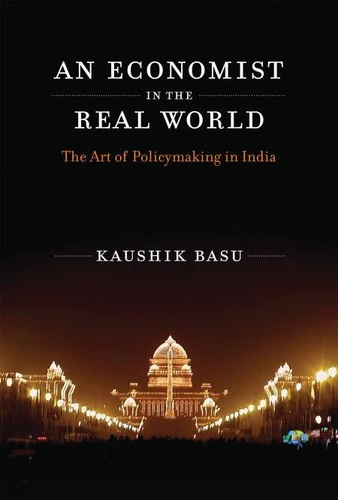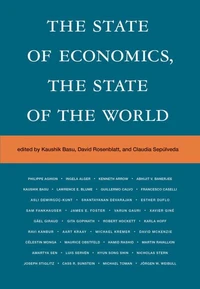An Economist in the Real World. The Art of Policymaking in India
Par :Formats :
Disponible dans votre compte client Decitre ou Furet du Nord dès validation de votre commande. Le format ePub protégé est :
- Compatible avec une lecture sur My Vivlio (smartphone, tablette, ordinateur)
- Compatible avec une lecture sur liseuses Vivlio
- Pour les liseuses autres que Vivlio, vous devez utiliser le logiciel Adobe Digital Edition. Non compatible avec la lecture sur les liseuses Kindle, Remarkable et Sony
- Non compatible avec un achat hors France métropolitaine
 , qui est-ce ?
, qui est-ce ?Notre partenaire de plateforme de lecture numérique où vous retrouverez l'ensemble de vos ebooks gratuitement
Pour en savoir plus sur nos ebooks, consultez notre aide en ligne ici
- Nombre de pages256
- FormatePub
- ISBN978-0-262-33168-5
- EAN9780262331685
- Date de parution09/10/2015
- Protection num.Adobe DRM
- Taille950 Ko
- Infos supplémentairesepub
- ÉditeurThe MIT Press
Résumé
An economist's perspective on the nuts and bolts of economic policymaking, based on his experience as the Chief Economic Adviser in India. In December 2009, the economist Kaushik Basu left the rarefied world of academic research for the nuts and bolts of policymaking. Appointed by the then Prime Minister of India, Manmohan Singh, to be chief economic adviser (CEA) to the Government of India, Basu-a theorist, with special interest in development economics, and a professor of economics at Cornell University-discovered the complexity of applying economic models to the real world.
Effective policymaking, Basu learned, integrates technical knowledge with political awareness. In this book, Basu describes the art of economic policymaking, viewed through the lens of his two and a half years as CEA. Basu writes from a unique perspective-neither that of the career bureaucrat nor that of the traditional researcher. Plunged into the deal-making, non-hypothetical world of policymaking, Basu suffers from a kind of culture shock and views himself at first as an anthropologist or scientist, gathering observations of unfamiliar phenomena.
He addresses topics that range from the macroeconomic-fiscal and monetary policies-to the granular-designing grain auctions and policies to assure everyone has access to basic food. Basu writes about globalization and India's period of unprecedented growth, and he reports that at a dinner hosted by Prime Minister Manmohan Singh, President Obama joked to him, "You should give this guy some tips"-"this guy" being Timothy Geithner.
Basu describes the mixed success of India's anti-poverty programs and the problems of corruption, and considers the social norms and institutions necessary for economic development. India is, Basu argues, at an economics crossroad. As CEA from 2009 to 2012, he was present at the creation of a potential economic powerhouse.
Effective policymaking, Basu learned, integrates technical knowledge with political awareness. In this book, Basu describes the art of economic policymaking, viewed through the lens of his two and a half years as CEA. Basu writes from a unique perspective-neither that of the career bureaucrat nor that of the traditional researcher. Plunged into the deal-making, non-hypothetical world of policymaking, Basu suffers from a kind of culture shock and views himself at first as an anthropologist or scientist, gathering observations of unfamiliar phenomena.
He addresses topics that range from the macroeconomic-fiscal and monetary policies-to the granular-designing grain auctions and policies to assure everyone has access to basic food. Basu writes about globalization and India's period of unprecedented growth, and he reports that at a dinner hosted by Prime Minister Manmohan Singh, President Obama joked to him, "You should give this guy some tips"-"this guy" being Timothy Geithner.
Basu describes the mixed success of India's anti-poverty programs and the problems of corruption, and considers the social norms and institutions necessary for economic development. India is, Basu argues, at an economics crossroad. As CEA from 2009 to 2012, he was present at the creation of a potential economic powerhouse.
An economist's perspective on the nuts and bolts of economic policymaking, based on his experience as the Chief Economic Adviser in India. In December 2009, the economist Kaushik Basu left the rarefied world of academic research for the nuts and bolts of policymaking. Appointed by the then Prime Minister of India, Manmohan Singh, to be chief economic adviser (CEA) to the Government of India, Basu-a theorist, with special interest in development economics, and a professor of economics at Cornell University-discovered the complexity of applying economic models to the real world.
Effective policymaking, Basu learned, integrates technical knowledge with political awareness. In this book, Basu describes the art of economic policymaking, viewed through the lens of his two and a half years as CEA. Basu writes from a unique perspective-neither that of the career bureaucrat nor that of the traditional researcher. Plunged into the deal-making, non-hypothetical world of policymaking, Basu suffers from a kind of culture shock and views himself at first as an anthropologist or scientist, gathering observations of unfamiliar phenomena.
He addresses topics that range from the macroeconomic-fiscal and monetary policies-to the granular-designing grain auctions and policies to assure everyone has access to basic food. Basu writes about globalization and India's period of unprecedented growth, and he reports that at a dinner hosted by Prime Minister Manmohan Singh, President Obama joked to him, "You should give this guy some tips"-"this guy" being Timothy Geithner.
Basu describes the mixed success of India's anti-poverty programs and the problems of corruption, and considers the social norms and institutions necessary for economic development. India is, Basu argues, at an economics crossroad. As CEA from 2009 to 2012, he was present at the creation of a potential economic powerhouse.
Effective policymaking, Basu learned, integrates technical knowledge with political awareness. In this book, Basu describes the art of economic policymaking, viewed through the lens of his two and a half years as CEA. Basu writes from a unique perspective-neither that of the career bureaucrat nor that of the traditional researcher. Plunged into the deal-making, non-hypothetical world of policymaking, Basu suffers from a kind of culture shock and views himself at first as an anthropologist or scientist, gathering observations of unfamiliar phenomena.
He addresses topics that range from the macroeconomic-fiscal and monetary policies-to the granular-designing grain auctions and policies to assure everyone has access to basic food. Basu writes about globalization and India's period of unprecedented growth, and he reports that at a dinner hosted by Prime Minister Manmohan Singh, President Obama joked to him, "You should give this guy some tips"-"this guy" being Timothy Geithner.
Basu describes the mixed success of India's anti-poverty programs and the problems of corruption, and considers the social norms and institutions necessary for economic development. India is, Basu argues, at an economics crossroad. As CEA from 2009 to 2012, he was present at the creation of a potential economic powerhouse.







